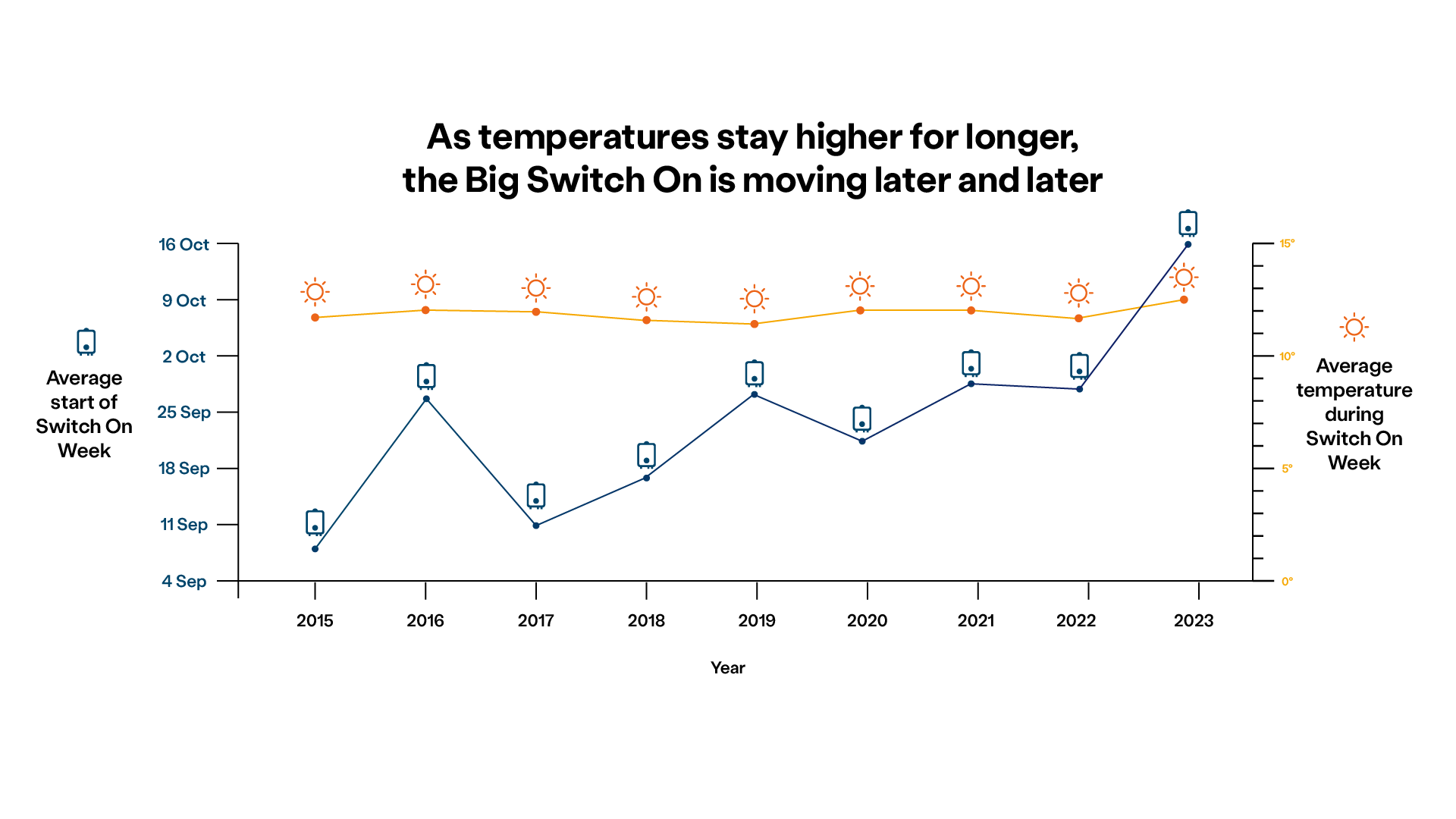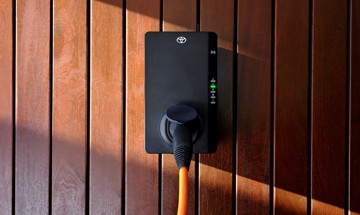British Gas data reveals households up and down the country are reaching for their thermostat for the first time in months this week, marking the latest time of year for the first phase of boiler switch on – due to warmer weather in late September and early October.
Generally, people switch their heating on after a prolonged period of average minimum temperatures below 9 degrees. British Gas historic data shows there are normally two boiler switch-on events each year – one occurring in late September and the remainder of customers waiting until the last week of October. However, warmer temperatures this year has resulted in a much later start to people switching on their boilers.

But as people starts turning their heating systems on, British Gas warns that this typically coincides with a spike in demand for engineer callouts – with 50,000 homes across the country expected to need help to get their heating and hot water systems back up and running in the coming days.
To help get the country get ready for the change in weather, British Gas is urging households to start preparing now to avoid any issues – and to ensure they are heating their homes efficiently. Simple tasks like bleeding radiators, increasing the pressure on your boiler and having it serviced can help to ensure the system is running effectively – especially after little or no use since last winter.
Joanna Flowers, a British Gas service and repair engineer, said: “We’ve seen a delayed start to autumn, but as the colder weather arrives, more and more homes will now be looking to turn their heating on.
“As they do, it’s incredibly important to make sure your heating system is running smoothly and able to withstand the winter weather. Not every boiler will give up after taking the summer off, but it’s a good idea to have it serviced to be sure. As well as looking after your boiler, making a few small, additional changes around the home will help ensure your heating and hot water system is working at its best.
“It’s also important to remember that a system that is in good shape won’t use more energy than it needs.”
Here’s my top ten tips to help households heat their homes efficiently and effectively this winter:
- Bleed your radiators: Air can enter the system and form bubbles at the top of your radiators, which stops them from working efficiently. If you notice cold spots at the top of your radiators, switch them off and after they cool, turn a radiator key in the valve at the top to let the air out.
- TLC for your boiler: In our experience, people often don’t give much thought to their boiler until something goes wrong with it – but regular services can prevent problems from arising at all. British Gas’s Homecare products mean customers can protect their boiler and have an annual service. It’s essential for keeping the household going, so it’s well worth looking after. To find out more, visit: www.britishgas.co.uk/homecare.
- Shut out the cold: You wouldn’t leave the back door open when the heating’s on, but warm air could still be escaping without you realising – and cold air could be sneaking in. Draught proofing around your windows and doors can save around £60 per year. Self-adhesive foam strips are easy to fit on windows to prevent draughts, while draught excluders are perfect if there’s a gap between your door and the floor. Your keyhole and letterbox can allow cold air into your home. Keyhole covers and letterbox brush strips are cheap to buy, quick and easy to fit and will stop those draughts.
- Furnish for warmth: Think about where your heat sources are, and make sure your radiators can do their job properly. Putting your sofa in front of a radiator may keep the best spot in the house extra toasty, but it will absorb heat that could be warming the rest of the room. Curtains and rugs have an important part to play as well, because thick material (the thicker the better) prevents heat from being lost through windows and doors – just don’t forget to open your curtains during the day so that the sun can do some of the work!
- Turn off radiators in rooms not in use: It’s important not to spend money heating spare rooms or other rooms not in use during the winter, so if you know a room isn’t going to be used, make sure you turn the radiator off and close the door to stop cold air circulating through the rest of the house. When you do need to use the room, just turn it back on ahead of time to heat it up.
- Wrap your pipes up warm: We often come across frozen condensate pipes – which can burst or crack when the water inside turns to ice. The best solution is to stop the water inside your pipes from freezing in the first place. Insulating materials are an easy, cost-effective solution, available from most DIY stores – it will ensure the pipes don’t lose heat saving an average of £15 on your bills and preventing any costly repairs.
- Heat your home, not your walls: Cover a thin sheet of card with tinfoil and place it behind your radiators (if you're feeling particularly crafty you can make it T-shaped so it sits on your radiator brackets). It'll reflect the heat back into your rooms, meaning they warm up faster and retain more heat. If DIY isn't your thing, you can also buy ready-made foil insulation. Households can save around £25 a year doing this depending on the insulation in their home.
- Check your thermostat settings: It’s easy to turn the thermostat all the way up when it's freezing cold but what temperature should your house be? Aim to set your main room thermostat somewhere between 18°C and 21°C and you can save around 10 percent on your heating bills – an average of £115 a year – by turning it down by 1 degree. It's also a good idea to set your thermostat to one temperature and then use a timer to turn it on and off when you need the heating most. That way you won't waste excess energy from leaving the heating on too high, for too long.
- Get your heating right for bedtime. Set your heating to start 15 minutes before you wake up and turn off 30 minutes before bed. This can save money and even help you get a better night’s sleep. You can also turn down the heat in any rooms not in use.
- Be energy smart: Unsurprisingly, winter is peak season for energy usage. Making the most of smart tech like thermostats means you can control your heating on the go and avoid wasting money on energy you’re not using. For example, if you’re stuck at work or delayed on the way home, you can use your smartphone to stop the heating from coming on too early and warming up an empty house. Also, if you have a smart meter installed, you can see how much energy you’re using in pounds and pence, helping you to identify where you can make savings.
- Get the help you’re entitled to: It’s always worth finding out if you’re eligible for extra assistance with your energy bills, especially before the cold weather sets in. Face-to-face advice, financial support and grants up to £1,500 are available from the British Gas Energy Trust (even if you’re not a British Gas customer). Most suppliers also offer assistance funds to provide grants towards energy costs.
British Gas YouTube videos showing customers how to winter-proof their homes.

News
British Gas extends PeakSave half-price electricity offer this summer
Tech & Innovation

News
British Gas launches exclusive offer with Mixergy smart hot-water tank owners
Sustainability

News
British Gas launches UK’s lowest heat pump rate to drive take-up
Sustainability

News
British Gas launches new initiative to 100% match energy bill payments for struggling customers
Energy crisis

News
British Gas and Toyota partner to deliver Toyota HomeCharge
Tech & Innovation

News
British Gas extends partnership with Barclays to offer half price home energy efficiency checks
Sustainability
